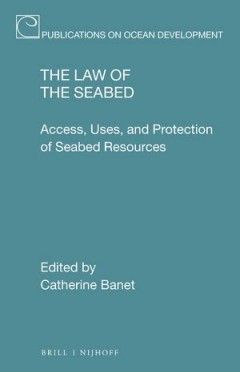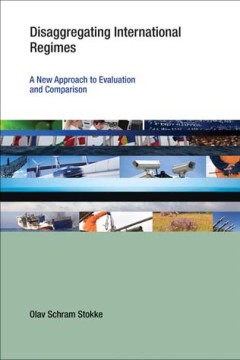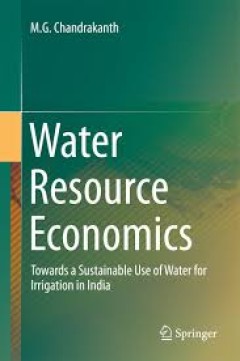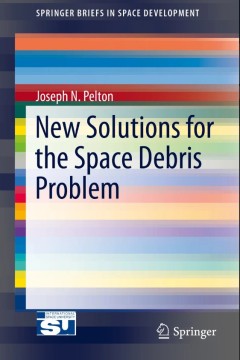Filter by

Viability of UNCLOS amid Emerging Global Maritime Challenges
This open access book assesses UNCLOS' resilience and vitality as a legal framework for addressing emerging global maritime challenges. Against the backdrop of a number of emerging global maritime challenges, including the rise of sea levels and the maintenance of maritime safety and connectivity, the preservation of marine biodiversity of areas beyond national jurisdiction, and the promotion o…
- Edition
- -
- ISBN/ISSN
- 9789819758388
- Collation
- XVI, 201 hlm; ill., lamp.,
- Series Title
- -
- Call Number
- -

The South China Sea: The Geo-political Epicenter of the Indo-Pacific?
This open access book focuses on the geopolitical competition in the South China Sea, an area with highly concentrated choke points in the Indo-Pacific, presenting ideas and recommendations to manage this competition and foster cooperation to maintain a peaceful and stable environment and promote sustainable governance of the South China Sea and of the Indo-Pacific in a broader sense. The inc…
- Edition
- -
- ISBN/ISSN
- 9789819782093
- Collation
- XIV, 160 hlm ill; lamp
- Series Title
- -
- Call Number
- -

The Law of the Seabed = Access, Uses, and Protection of Seabed Resources
The Law of the Seabed reviews the most pressing legal questions raised by the use and protection of natural resources on and underneath the world’s seabeds. While barely accessible, the seabed plays a major role in the Earth’s ecological balance. It is both a medium and a resource, and is central to the blue economy. New uses and new knowledge about seabed ecosystems, and the risks of disp…
- Edition
- -
- ISBN/ISSN
- 9789004391567
- Collation
- 638 hlm; ill., lamp.,
- Series Title
- Publications on Ocean Development
- Call Number
- -

Disaggregating international regimes :a new approach to evaluation and compar…
"Evaluating the effectiveness of international regimes presents challenges that are both general and specific. What are the best methodologies for assessment within a governance area and do they enable comparison across areas? In this book, Olav Schram Stokke connects the general to the specific, developing new tools for assessing international regime effectiveness and then applying them to a p…
- Edition
- -
- ISBN/ISSN
- 026230578X
- Collation
- 1 online resource (xi, 348 pages) :illustrations, map.
- Series Title
- -
- Call Number
- -

Water Resource Economics Towards a Sustainable Use of Water for Irrigation i…
This book uses resource economics costing approaches incorporating externalities to estimate the returns for the country’s irrigation and demonstrates how underestimating the cost of water leads farmers to overestimate profits. The importance of the subject can be judged in light of the fact that India is the largest user of groundwater both for irrigation and for drinking purposes, pumping t…
- Edition
- -
- ISBN/ISSN
- 978-81-322-2479-2
- Collation
- -
- Series Title
- -
- Call Number
- -

Responsibility and Liability in the Context of Transboundary Movements of Haz…
The term “hazardous wastes” covers a wide range of disused products and production wastes generated not only in industrial sectors, but also in all areas of everyday life. Hazardous wastes are to a large extent shipped by sea to third countries for recycling or disposal. While the procedural requirements for such movements are laid out in the 1989 Basel Convention, explicit rules of respons…
- Edition
- Ed. 1
- ISBN/ISSN
- 978-3-662-43349-2
- Collation
- -
- Series Title
- -
- Call Number
- -

Regulation of Commercial Space Transport: The Astrocizing of ICAO
This book provides a look at the various nuances of the commercial aspects of space transport and offers a workable and practical legal and regulatory approach to be taken by the International Civil Aviation Organization. The book also addresses the perceived lack of wisdom in neglecting to consider the basic legal structure of a regulatory regime for commercial space transport as a first step …
- Edition
- -
- ISBN/ISSN
- -
- Collation
- -
- Series Title
- -
- Call Number
- -

The Shipping Industry, Ocean Governance and Environmental Law in the Paradigm…
This book examines the corpus of status quo environmental legal regime, geographical issues and redundant “stakeholder claims,” which persist in the Arctic. It examines multifarious theories relating not only to conflicting and opposing interests, but also to parties to whom the shipping industry should be accountable. The unique aspect of this book is the Corporate Social responsibility an…
- Edition
- -
- ISBN/ISSN
- 978-3-319-12541-1
- Collation
- -
- Series Title
- -
- Call Number
- -

The Hamburg Lectures on Maritime Affairs 2011-2013
In 2007, the International Max Planck Research School for Maritime Affairs together with the International Tribunal for the Law of the Sea (ITLOS), both based in Hamburg, decided to establish an annual lecture series, the "Hamburg Lectures on Maritime Affairs" - giving distinguished scholars and practitioners the opportunity to present and discuss recent developments in this field. The present …
- Edition
- 1
- ISBN/ISSN
- 978-3-642-55104-8
- Collation
- X, 302, 4 b/w illustrations
- Series Title
- Hamburg Studies on Maritime Affairs Hamburg Studies on Maritime Affairs
- Call Number
- -

New Solutions for the Space Debris Problem
Addressing a pressing issue in space policy, Pelton explores the new forms of technology that are being developed to actively remove the defunct space objects from orbit and analyzes their implications in the existing regime of international space law and public international law. This authoritative review covers the due diligence guidelines that nations are using to minimize the generation of …
- Edition
- 1
- ISBN/ISSN
- 2191-8171
- Collation
- XI, 94
- Series Title
- SpringerBriefs in Space Development
- Call Number
- -
 Computer Science, Information & General Works
Computer Science, Information & General Works  Philosophy & Psychology
Philosophy & Psychology  Religion
Religion  Social Sciences
Social Sciences  Language
Language  Pure Science
Pure Science  Applied Sciences
Applied Sciences  Art & Recreation
Art & Recreation  Literature
Literature  History & Geography
History & Geography